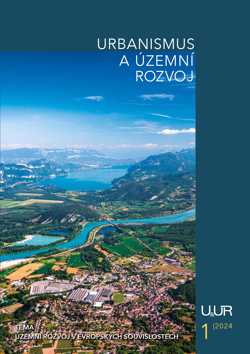
New European Bauhaus, by Ilja Kocian, Martina Černá & Petr Lešek
The New European Bauhaus (NEB) is a project delivering hope and new perspectives. It complements the Green Deal for Europe with a cultural and creative dimension promoting the sustainability of innovation, technology and the economy as a whole. It provides the benefits of ecological transformation through tangible experience at the local level. However, the NEB initiative does not have its own funding source, it is funded across the financial programmes and instruments of the European Union. NEB principles should be taken into account in all types of construction with the potential to affect the built environment.
Using the New European Bauhaus in the Operational Programme Just Transition, by Tomáš Komm
The Operational Programme Just Transition piloted elements of the New European Bauhaus. Projects that place emphasis on aesthetics, sustainability and inclusion are expected to benefit from it.
Update of the National Recovery Plan - New MRD Components, by Nikola Blokešová
We have already reported on the National Recovery Plan, in particular the support for brownfields revitalisation, in 2022. However, since then, there have been several changes to the National Recovery Plan - it has been updated in response to the Russian invasion of Ukraine in February 2022 and the subsequent energy crisis, and there has been an increase both in its allocation and the areas (components) supported by the Ministry of Regional Development under the National Recovery Plan. Which are they?
News in Construction Law from 1 January 2024, by Karel Wirth
The (new) Building Act came into force on 1 January 2024. However, during the transitional period, from 1 January 2024 until 30 June 2024, the existing legislation is still applied, with the exception of the authorization of specified buildings. In addition, Act No. 465/2023 Coll., amending the Linear Act and other related laws entered into force on 1 January 2024. This article briefly comments on the selected parts of the amendment from the perspective of spatial planning.
Competitiveness and Spatial Planning. Insights from Europe, by Vít Řezáč
When I was asked in the early 1990s by the then-chief architect of Prague, the great Ivo Oberstein, to carry out quick research into spatial planning practices in Germany, I heard about the concept of competitiveness for the first time from the head of the spatial planning department of the city of Hamburg, Mr Buss. In Frankfurt, they emphasized to me again that they must have a territory ready for investors, because the cities are in competition with each other both in Germany, and Europe-wide, Frankfurt even worldwide. "You know, it's not easy at all, but otherwise we'll be out of the loop," they added. In Stuttgart, the whole story repeated itself. As a young architect trained in the planned socialist economy, I did not fully appreciate the importance of that message. A recent stirring report by the Chamber of Commerce points out, among other things, that even after thirty years we have not found a recipe in spatial planning to keep pace with other countries. We are becoming, or rather have already become, unattractive to foreign investors due to the unpredictable investment permit process. The locals have got used to it. The point is not that we should mindlessly build up cities, but that, perhaps as in competing EU countries, the spatial planning system should be set up in such a way (and not only that!) that building permits do not become an obstacle to providing social cohesion in the country from a longer-term perspective.
Czech Spatial Planning as a Subject of EU Research. ESPON COMPASS Project, by Karel Maier & Jan Kabrhel
The EU ESPON COMPASS project was concerned with comparing the development of spatial planning systems in European countries. The findings on Czech spatial planning in the context of other countries were followed up by other works, of which the article describes in more detail a follow-up case study dedicated to linking Czech spatial planning with the cohesion policy applied by the EU. The study resulted in a set of recommendations, some of which are already being implemented.
The City of Brno Involvement in the ESPON SPIMA and ESPON METRO Projects, by Soňa Raszková
The city of Brno has been actively involved in international research projects together with other European metropolitan areas. During the past five years, the city made part of two projects within the ESPON (European Spatial Observation Network) programme. These were the ESPON SPIMA and ESPON METRO projects.
Experience with a Public Law Contract according to the Building Act No. 183/2006 Coll., by Jiří Gerö
The institute of a public law contract is not a modern achievement of legal regulation. It was already used in our territory in the past, however, it was not until Act No. 500/2004 Coll., the Administrative Procedure Code, as amended, that it received a more comprehensive general regulation. This article does not deal with the extensive issue of public law contracts, which are also regulated by other legal regulations, however, focuses exclusively on the public law contract, which replaces the decision under Act No. 183/2006 Coll., on Spatial Planning and Building Code, as amended, with the aim to make its use more popular in problem-free building procedures and specify its use within the existence of Act No. 283/2021 Coll., the Building Act, as amended.